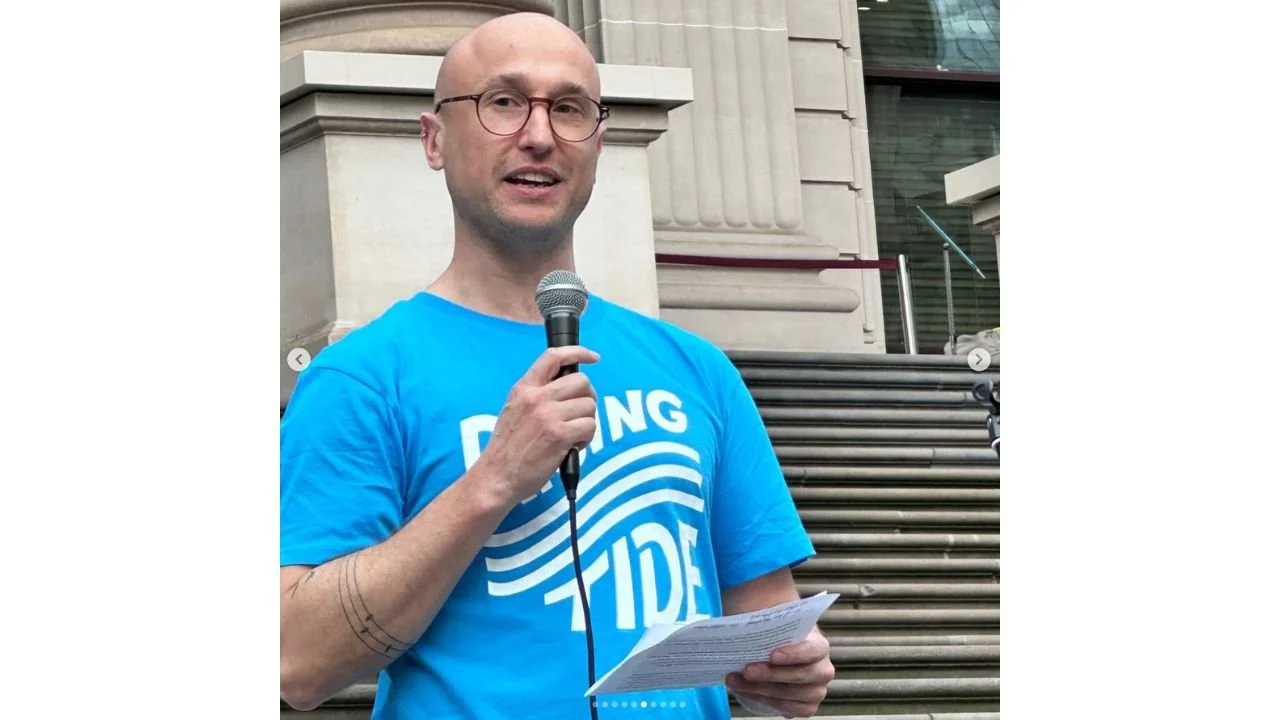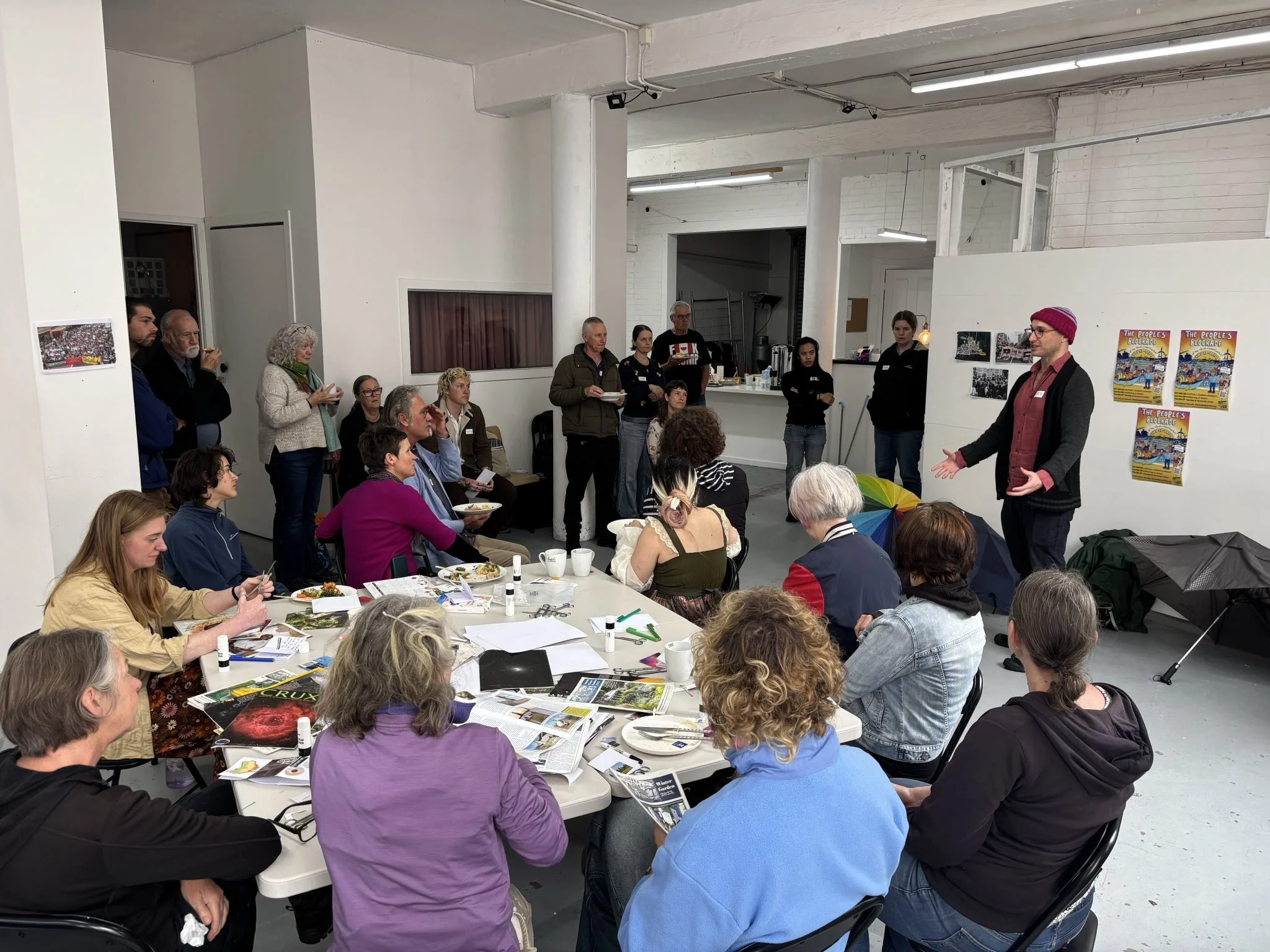Facilitation, democracy, and climate Action: Nick Willis on building power through community
Volunteer facilitator and climate organiser Nick Willis shares how Groupwork Centre’s facilitation training deepened Rising Tide’s culture of care, strengthened their organising, and helped grow one of Australia’s most remarkable climate movements.
Nick Willis speaking at the recent Defend Dissent rally. Photo by Rising Tide, used by permission.
When Nick Willis describes activism, he doesn’t speak in slogans or abstractions. Instead, he talks about democracy. Not the version that happens every three years at a ballot box, but the messy, relational, everyday kind – the kind that ordinary people build together.
“I see activism as a necessary part of democratic politics,” he says. “It’s a form of power that exists outside the moneyed, cut-throat world of mainstream politics – power for the people who are usually sidelined.”
Nick is a volunteer facilitator with Rising Tide, the grassroots climate justice movement behind the People’s Blockade – a colourful, community-powered “protestival” that brings thousands to Newcastle Harbour, New South Wales, each year to demand an end to fossil fuel exports. With mass participation, joyful defiance, and deep relational organising, the blockade has become one of the world’s most iconic climate actions.
Building a movement of that scale and spirit doesn’t happen by accident. It requires a different kind of skill – one far less visible than banners and flotillas: facilitation. And that’s how Nick found his way to Groupwork Centre.
Where social change meets group process
Groupwork Centre has been training facilitators since 1984, grounded in decades of social movement practice, intentional community-building, feminism, nonviolent communication, First Nations wisdom, and process-oriented psychology. Rising Tide’s values align naturally with that lineage.
So when Groupwork Centre offered a heavily subsidised facilitation course for climate organisers, Nick’s fellow Rising Tiders encouraged him to sign up. “Someone from the group told me she’d done it and couldn’t recommend it enough. Rising Tide promoted it too as we all knew how important facilitation is to our movement.”
Nick arrived expecting practical tools. What surprised him most was the training’s deep attention to emotional safety and community care.
Coming from academia – where he’s spent the last six years doing a PhD – he was used to rooms where conversations were sharp, rational, and often adversarial. Attending to emotion in those environments could be seen as condescending. But climate activism is different.
“Activists engage with emotionally loaded issues – climate change, public housing, genocide, racism. People are sacrificing their time, energy, and bodies. More of our selves are invested. Caring for each other’s emotional and spiritual needs is essential.”
The training didn’t soften the work – it strengthened it.
Nick Willis at one of the People’s Blockade preparation meetings. Photo by Rising Tide, used by permission.
The moment facilitation ‘clicked’
Nick remembers a particular moment clearly. He was facilitating a Rising Tide training in Naarm/Melbourne, introducing new members to nonviolent action principles. He used a tool from Groupwork Centre: framing group purpose and inviting the group to co-create group agreements.
“I could see changes happening in the room as people named what they needed to feel safe. Some relaxed back into their chairs. Others leaned forward. A few grinned when they heard someone across the circle articulate exactly the same need.”
The training also gave Nick a simple but powerful toolkit: the microskills of good facilitation. He now finds himself consciously using them: summarising contributions, clarifying complex ideas, drawing out quieter voices, noticing emotional tone in the room, and naming tensions without escalating them. “As a facilitator, I’m constantly forming a short summary in my head – ready to offer it if it helps the discussion move forward,” says Nick.
But the biggest insight? Understanding power in facilitation. In academia, teachers set the direction. Students follow. But in community organising, that dynamic can disempower. “When facilitators take responsibility for the discussion, the group unconsciously gives it up. We want meetings where people leave feeling energised – not like passive students.”
That shift in mindset changed the way Nick approaches nearly every meeting.
Activism should be open to everyone – but it takes effort
Nick believes activism should be a space where anyone can get involved. But he’s also realistic about the barriers: people’s limited time and finances, the fear of not being welcomed, concerns about how their identity will be treated, or group cultures that feel hard to navigate.
Rising Tide works hard to make the movement more accessible – imperfectly, but intentionally. They’ve set up caucuses for queer members, people of colour and people with disability. They offer travel support for First Nations participants joining the People’s Blockade. They partner closely with Indigenous communities, and they invest in conflict management and community care.
“Inclusivity is an ongoing process, not a destination,” Nick says. “But the harder a group works at it, the more legitimate its voice becomes.”
Good facilitation is a big part of making that possible.
Looking ahead: COP31 and beyond
Rising Tide is expanding quickly. With COP31 on the horizon in 2026, the movement is preparing for bigger, more coordinated national campaigns. That means more meetings, more working groups, and more people needing to work together smoothly.
For Nick, the key is simple: “Facilitation is the glue. Every meeting, every training, every working group needs it. That’s how we build community – and community is how we build power.”
As Rising Tide prepares for the next People’s Blockade (27 November–2 December 2025), the scale is massive: thousands of participants, dozens of teams, months of behind-the-scenes organising. But at its core, the movement is powered by something simple and deeply human: People learning to work well together, supporting each other, welcoming difference.
Building a better world not just through protest, but through the way they relate – in circles, meetings, and conversations. And for him, facilitation isn’t an optional extra; it’s the backbone of democratic action. Therefore, Nick’s advice to other organisers is straightforward: “It’s absolutely worth it. The trainers are excellent, the content is rich, and the skills will genuinely improve how your organisation works.”
He also sees an ongoing role for the broader Groupwork community – from sharing Rising Tide events, to volunteering as facilitators, to continuing support for subsidised training, to offering skills in conflict resolution and emotional resilience. “Anyone connected to Groupwork Centre brings such valuable awareness. That’s exactly what the climate movement needs.”
And for Nick Willis, it’s a reminder that even in the urgency of the climate crisis, how we work together matters just as much as what we’re fighting for.
The People’s Blockade is Rising Tide’s landmark annual action against coal pollution and climate inaction. With its vibrant “protestival” energy, mass participation, powerful symbolism and deep sense of community, this year’s Blockade runs from 27 November to 2 December 2025 – and registrations are now open. Be part of the movement and sign up here: https://www.risingtide.org.au/pb2025


